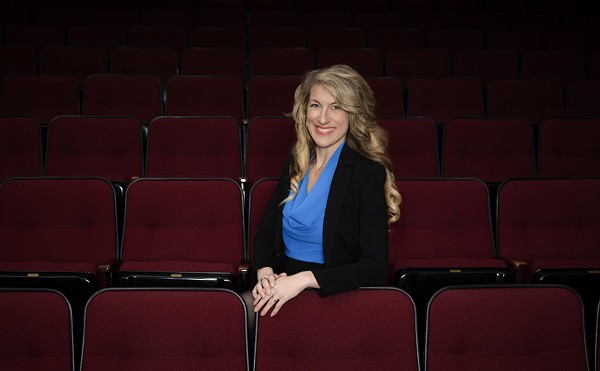For some reason, Leni wasn't a character in the crowded field presented in Historyonics' new, mostly yawny Dark Glory, which purports to tell the story of this controversial Olympiad. This is a pity, because the world-history events (rising anti-Semitism in Germany, mostly) are so chewed over that we don't even get to the Games until after the intermission. You may recall the 1936 Olympics for black American runner Jesse Owens, who triumphed over the Aryans (and everyone else) in track and field. Are there are other stories we don't know? Hell, there were stories in Olympics 2000 we never heard about.
"Creator" (as opposed to writer) Larry Roberson and director Lee Patton Chiles have taken what one presumes are authentic text and autobiography (though no footnotes or citations appear in the program) and leached the life from them. Historyonics has a hamstringing mandate of using text verbatim, but the company does very little with the inherent drama of this real-life event. Worse, a talented cast might as well be croquet wickets planted on the stage for all the action they get. More patronizing is making them croon incredibly piffly pop songs of the day as scenic transitions. Right after an evil International Olympic Committee baddie (hey, are there any good IOC members?) explains what an insensitive jerk he is, he sings the deliriously sappy "Painting the Clouds with Sunshine." Is this supposed to be irony? Trenchancy? No knowing wink for a tip, but then, few of the dozen numbers get more than a verse or two.
Back to characters -- there's a reporter commenting on the European scene, IOC prez Avery Brundage and many sinned-against athletes, including Owens and his forgotten teammate Marty Glickman. This poor lad was unceremoniously yanked from a relay, implying that even the American team succumbed to anti-Semitism. The most interesting personal story is high-jump genius Gretl Bergmann. Systematically squeezed out of competitions in her home country, she was nudged from the Games even after she tied the world record. Or was it the Olympic record? So many, many, many facts, here. Yet we never find out what happens to Gretl in the end.
Roberson and Chiles haven't provided enough opportunities for the actors to interact, minimizing the actual drama. But there are tedious exposition and explanation aplenty. Most of the actors were off-book, but even having hands free didn't allow for much, you know, movement. Part of the problem is script organization -- if you devote an act to everything leading up to the Games, you've got to sift through a lot of names, pronouncements, acts of Nazi aggression and so forth. Dizzying wads of information came flying off the stage, and plenty of period hyperbole -- about the significance of Hitler to his adoring throngs, for example, and how he "restored mysticism to their drab lives."
Putting aside the structural morass, the static staging and the disastrous lighting (plenty of characters began yet another long, windy speech in darkness before the spotlight found them), the cast showed pluck and verve in a situation that didn't look like a lot of fun. No one had a German accent that would have made those on Hogan's Heroes sound unsubtle, but no matter. As the increasingly irked high-jumper Gretl, Elizabeth Watt had a pugnacious appeal. Eric J. Connors played Jesse Owens, and although he didn't have the dignity we see even in pictures of this ber-mensch, he had a warmth and liveliness that came as a relief after too much thudding exposition. Dean Christopher showed plenty of relish for his villainous turns and has a snap-brim style with a song. Jared Joplin's geniality worked in his favor as the gratefully credulous Marty Glickman. When Glickman got the disappointing news, his rage mounted believably. Finally, Christopher Hickey showed solidity and presence, but his comic potential was underused, save in a truly exquisite cameo as the boneheaded president of Ohio State University. Poor Hickey has the most hackneyed and lengthy speech near the evening's close -- all about the evil, the horror, the monstrous tyranny and so on (with the actors in requisite striped pajama tops). Where those Olympics fit into the titanic epic that is the Holocaust is damned interesting indeed, but Dark Glory sprawls all over the field.





